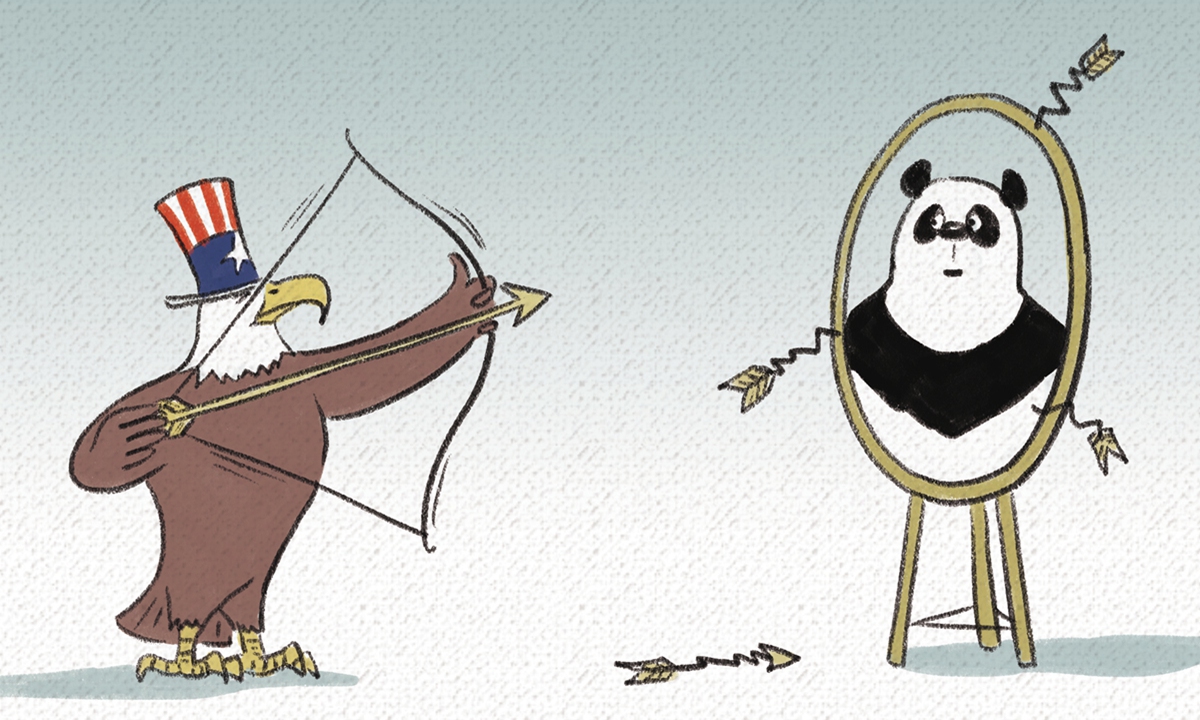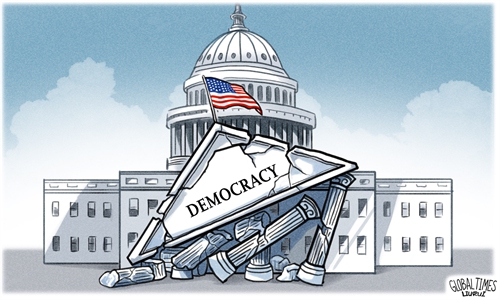
Illustration: Liu Rui/GT
Recently, some US elites have been hyping up the emergence of a so-called new world order. According to the New York Times and the Wall Street Journal, as the US draws in democracies to create a camp against China - they say Beijing is also drawing in "autocracies" or uniting "US adversaries" to forge an "alliance."The New York Times argues that with each new twist in relations between the countries involved, camps are emerging more clearly and as a result, "the world is increasingly dividing into distinct… camps."
This leads to their conclusion that a new world order is emerging.
Indeed, in the usual Western narrative, it seems that two camps have already popped up. The West believes that on the one hand, the US is uniting other Western countries to suppress and sanction so-called politically undemocratic dictatorships, and on the other, countries such as China, Russia and some Middle Eastern countries will join hands to counter US-led sanctions.
But this is just a little hint of the intensifying confrontation between different countries. It has nothing directly to do with the world order. Until now, the Western world, headed by the US, still views the world with an old Cold War mentality. Many Western countries, as well as the Western media, are trying to block the rise of emerging countries such as China. In fact, the US-led coterie is still stuck in their mental comfortable zone of the past. These Western countries, particularly the US, are slow to accept the changes in the world because they have become accustomed to the various benefits they can enjoy as dominant players in the world order.
At the same time, the US wants to promote the values it shares with other Western countries so that it can maintain its leading position. The US believes the world order it represents is the dominant order. It may view everything else different from itself as a challenge. Take China, which does not accept US model. The US finds it can hardly penetrate its influence in China, and worse, China's development model is being recognized by more and more countries. As a result, the room for the US to promote its own model is shrinking and it starts to do everything possible to suppress countries that are different from itself.
As a result, Washington will do everything possible to suppress countries like China. This shows that the West is still basking in the memory of its past glories. It still sees the world from its own perspective, not others'. It does not realize that this perspective is outdated, closed and narrow. They cannot change, and do not want to adapt to the new world.
In the New York Times article entitled, "An Alliance of Autocracies? China Wants to Lead a New World Order," it is suggested that China has taken it upon itself to challenge the existing international order which is led by the US and usually guided by democracy, respect for human rights, and adherence to the rule of law.
This is obliviously a misunderstanding of China. Beijing never aims to challenge the established international system which is led by the US. Nor does it actually export its values to the outside world as the Soviet Union did. It is true that there are some concepts created by outsiders that summarize China's development model, such as the Beijing Consensus. But it is untrue to say that China is actively challenging the existing world order.
The West is forcibly placing China, and other countries that it has seen as rival, in opposition to democracy, human rights, and the rule of law. In fact, the West is using the hegemony of its narratives to justify its own behavior. It first gives a negative characterization to countries with systems different from its own, claiming them to be against the so-called universal values. In this way, it is easier to rally support from its camp to suppress those that are not like the West.
In the typical Western narrative, China's cooperation with other countries is seen as uniting like-minded countries to confront the West. However, it is the Biden administration that has openly embraced the alliance as a major strategy to deal with China. Meanwhile, Beijing still sticks to the principle of non-alignment. In the face of increasing suppression from the US, China hopes to unite those that are also the victims of the US hegemony to jointly counter US bullying and unilateralism. China and those countries are actually seeking international justice.
The author is a research fellow at the Institute of American Studies at the Chinese Academy of Social Sciences. opinion@globaltimes.com.cn

